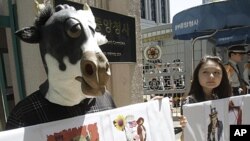Activists pressuring South Korea's government to renew a ban on U.S. beef imports took to the streets Wednesday in Seoul.
Organizers are hoping to revive the street activism of four years ago when South Korea decided to resume U.S. beef imports. That movement turned into the largest anti-government protests this country had seen in 20 years.
The catalyst for this candlelight rally is the first case of Bovine Spongiform Encephalopathy, or mad cow disease, since 2006 in the United States.
The case involved a 10-year-old dairy cow in the state of California.
Those who want to re-impose the beef ban say they do not trust either the United States or South Korea's government to properly screen cattle for the neurological disorder.
Humans eating meat from affected animals are at risk to acquire a variant of the rare, but fatal, brain-wasting disease. Nearly all of the approximately 200 cases in the past six years have been in Europe. There has never been a human case in South Korea.
But that has not kept South Korean consumers like these from shunning American beef in recent years. The main buyers of U.S. beef in South Korea are schools, the military and some restaurants.
A larger target for the thousands of protesters who have turned out tonight is a recently activated trade agreement between Seoul and Washington. The political left hopes to turn the trade pact into an election issue during this year's South Korean presidential campaign.
South Korea is the fourth-largest importer of American beef.







